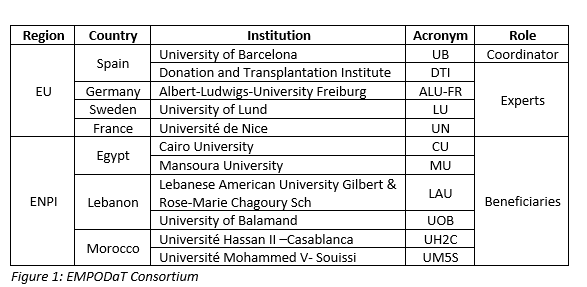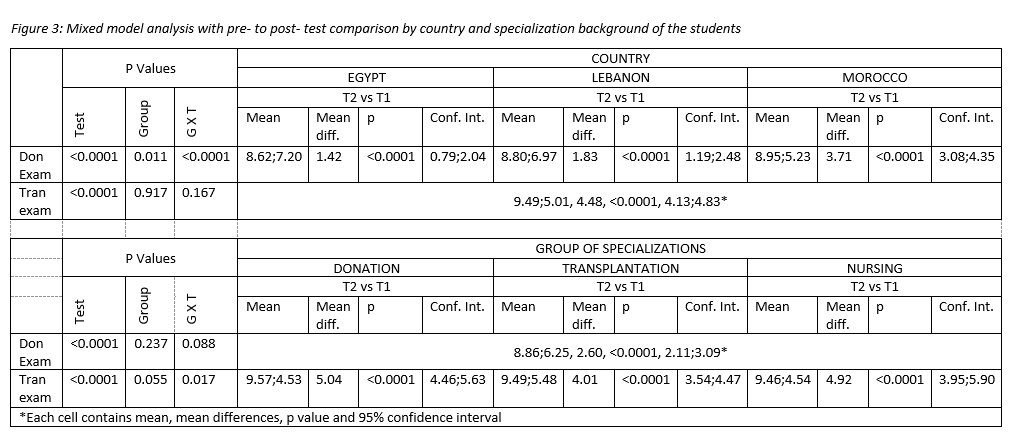Knowledge Improvement Results of the European-Mediterranean Postgraduate Program on Organ Donation and Transplantation Project (EMPODaT): A 3 Years’ Training Project in Egypt, Lebanon and Morocco
Martí Manyalich1,2, Chloë Ballesté Delpierre1,2, Melania Istrate2, Aneta Toncheva2, Patricia Peralta2, Gloria Paez2, Ricard Valero1,2.
1Surgery, University of Barcelona, Barcelona, Spain; 2TPM, Donation and Transplantation Institute, Barcelona, Spain
Introduction: The consortium constituted by 4 European Univ., 1 European Foundation and 6 beneficiary Univ. from Egypt, Lebanon and Morocco (fig 1)  implemented the EMPODaT project from 2010 to 2014. Its aim was to cooperate in a higher education program of Organ Donation and Transplantation in Egypt, Lebanon and Morocco Univ. in accordance with the European Space for Higher Education guidelines as a TEMPUS product (an Education, Audio-visual and Culture Executive Agency (EACEA) program).
implemented the EMPODaT project from 2010 to 2014. Its aim was to cooperate in a higher education program of Organ Donation and Transplantation in Egypt, Lebanon and Morocco Univ. in accordance with the European Space for Higher Education guidelines as a TEMPUS product (an Education, Audio-visual and Culture Executive Agency (EACEA) program).
Materials and Methods: Training (available in English and French) was designed in 1 academic year of 30 ECTS credits (750–900 hours) employing blended learning methodology. Pre- and Post-training tests, self-assessing activities, and traineeship activity charts were used to evaluate the students. The results obtained in the pre- and post- test of the donation and the transplantation modules were analysed using mixed models between countries and specialization background of the students.
Results and Discussion: 90 students were trained (15 per Univ.), 39W-51M, 79 doctors (23% ICU, 22% surgeons) and 11 nurses. Significant differences were found among improvement knowledge between the countries and specialization background (donation, transplantation or other fields).
Significant differences were found among improvement knowledge between the countries and specialization background (donation, transplantation or other fields). Donation knowledge improved in all countries but Morocco was the most beneficiated (Mean diff. Morocco 3.71±0.32 > Lebanon 1.83±0.32 >Egypt 1.42±0.32) no significant differences were found between background specialization groups. Meanwhile the improvement of transplantation knowledge were no significant comparing countries but the donation background group was significantly more beneficiated (Mean diff. Donation 5.04±0.29> Nursing 4.92±0.49 >Transplantation 4.01±0.23).
Donation knowledge improved in all countries but Morocco was the most beneficiated (Mean diff. Morocco 3.71±0.32 > Lebanon 1.83±0.32 >Egypt 1.42±0.32) no significant differences were found between background specialization groups. Meanwhile the improvement of transplantation knowledge were no significant comparing countries but the donation background group was significantly more beneficiated (Mean diff. Donation 5.04±0.29> Nursing 4.92±0.49 >Transplantation 4.01±0.23).
Conclusion: Students profile was homogeneous among the 3 beneficiary countries and the gender balance was respected in all universities. Knowledge improvement in organ donation was greater than in transplantation topics. Morocco was the most beneficiated country obtaining better final scores in the donation module and the students with donation related specializations were the most beneficiated of the Transplantation topics.
Ashraf Adel Mosharafa . Ahmed Ali Morsy Ali. Mohamed Adel Bakr. Ahmed Ibrahim Kamal Abdelkader. Hussein Sheashaa . Farida Younan. Georges S. Juvelekian. Maha Khachab. Nadia Tahiri Jouti. Mohammed Benghanem Gharbi. Wissam Faour. Rabia Bayahia. Taoufik Dakka. Peter Desatnik . Patrick Jambou. Klaus Michael Lücking. Przemyslaw Pisarski. Patrick Samson-Himmelstjerna. Antoine Stephan. Francesc Martí..
